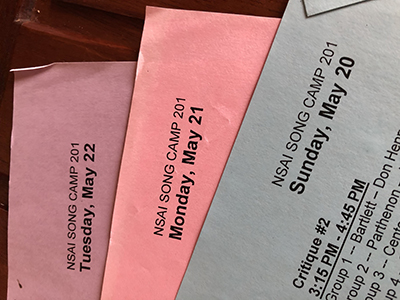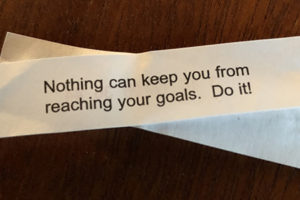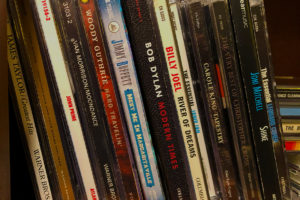NSAI Song Camp 201 was offered May 20-22, 2007 and I decided to attend. It was limited to forty-two people and offered six song critique sessions. The faculty for Song Camp 201 was Walt Aldridge, Rick Beresford, Craig Carothers, Don Henry, James Dean Hicks, Ralph Murphy, and Hugh Prestwood.
After NSAI Song Camp 101, I listened to CDs of the teachers’ songs and I studied their lyrics. I began slowly reading Pat Pattison’s book about lyric form and structure. I had to be patient and read only as much in one sitting that I could remember and incorporate into my work.
Also, I worked diligently during March revising four songs and only writing one new one. After that, I realized that sometimes I simply need to learn what I can from the process of rewriting and then move forward. I hoped that with each song I would learn and write better songs.
The bad days are part of the path. They must be there. Nothing is learned on good days. We learn when things are hard.
—Rick Beresford, singer-songwriter, teacher
The following is taken from my class notes.
NSAI Song Camp 201 Classes
Rick Beresford’s Class:
We began each day with Rick’s class. He described how songs are written and discussed inspiration and offered ways to unlock creativity.
Credo:
Go beyond the ordinary. Push your limits on a daily basis. Have fun intensely—take fun seriously!
Everyday push yourself beyond your limits. Each day is a new day. Most of what we need, we already have—unless we think we don’t. The way we feel about ourselves is how we lasso the clouds. We have everything we need right now to be a hit writer. We were born to write songs—not everyone—but everyone in this room.
Catching fish analogy:
We are all in the same place fishing. Don’t compare yourself to others. We are who we are. Each of us has our own story, our own task and has to learn to catch the fish in our fishing hole. We can watch others and their techniques—and learn from them—but we need to find our own way.
Honor your process and speed and what works for you. Live in the moment of life and watch for the “signs.” There will be discouragement. It is part of life. Nothing is learned on good days. We learn when things are hard.
Art exercise:
Write wild and free. Keep writing and don’t edit. Be creative. Go deep.
The universe talks to you—don’t think—just write.
Two types of creativity:
1. the flow (linear like the exercise above)
2. working the puzzle
Intuition is our main force, but we also need tools. We need to know all the possibilities.
Originality is a series of tiny surprises. Good storytellers save the big thing or the unique idea for the end.
We all have our path. When we are on it, the universe will conspire to help us get what we need and get where we need to go. There will be testing along the way. There will be discouragement. It is part of life, part of the test. Be aware. Pay attention to things around you.
Never question and never doubt your mystery. You will always have the ability. Create new moments. Don’t live in the past. Don’t look back.
Compelling emotion is important to any song. The first two lines of a song should intrigue the listener. Then they have to know what happens next.
Go beyond the ordinary—but at the same time it needs to sound ordinary.
Your song has to be loved every time someone hears it.
Listeners are voyeurs. They love to imagine themselves in the situations of your songs.
Paul McCartney loved musicals and studied all the old song styles. The Beatles’ album Rubber Soul has almost every song form available to use. Study the songs on this album.
Craig Carothers’ Class:
Assimilate the craft so you don’t have to think about it. Write what you want to write. Don’t hold songs in. Write the songs you have ideas for and feel inspired to write. Don’t limit yourself though. Step out of the box sometimes.
Do what you do well. Don’t copy someone else’s style or approach. Anything anybody tells you is just their opinion.
Pick out songs you love. Analyze them. Ask the question, “Why do certain songs speak to me?”
Don’t get bogged down with grammar for Nashville.
Make sure you explain yourself in your songs. Don’t expect the listener to read between the lines. Don’t use obscure references.
The music needs to unfold like the pace of the words.
Write and rewrite—for clarity and flow.
The best part of songwriting is writing a song that you love. Success is a shot in the dark. You cannot control success. Only control your song and enjoy writing!
Ralph Murphy’s Class:
You have sixty seconds to grab a listener’s attention. Don’t give the listener’s you. They want to hear themselves in the song.
Songwriter Harlan Howard said: “Tell them. Tell them you told them. Remind them you told them.”
Make the words easy to sing. Don’t contrive rhymes.
Hugh Prestwood’s Class:
Write from experience. Imagine you are having a conversation in a bar. Tell a story to someone you don’t know. Make it sound like you talk. Don’t be contrived. What would you really say in a situation?
Use the least amount of information possible. It is like giving good directions.
Don’t get in a hurry. Be patient and just work.
Doubt shuts down creativity. Hang in there. Don’t get negative. When finishing songs, don’t panic.
Do you have something you really want to say? Get excited about a subject—maybe something you have witnessed or experienced.
James Dean Hicks’ Class:
James Dean Hicks said we should always ask the question: “What is our point or purpose to our song?” Then answer that question by using the song title in our answer.
I know that sounds obvious. I played for him a song called “Ocean of Whiskey.” I thought my point was obvious, but I still could not verbalize it succinctly using the title of the song in my explanation.
You are painting a picture with your lyrics. Give enough details.
Walk down the hallway. The chorus is at the end of the hallway. Lead the listeners there. Don’t open doors you don’t want them to go in.
Write about your life. Songs need to have heart. Combine heart with poetry. Listen to your inner voice not outside voices.
I asked him if he wrote his songs out in music notation. His reply was, “Why would I want to do that?” That answer always brings a smile to my face. Most singer-songwriters keep their songs in their head and do not use music notation. For me, songs don’t exist if I don’t have them written out. In fact, part of my ritual of attending song camps is making copies of all my lyric sheets, lead sheets, and CDs with the songs I recorded to take to song camp.
Don Henry’s Class:
He did song critiques. I played “Heart of Ice.” I think that is my best song so far and it has fewer places vocally where I have to shift awkwardly into middle voice or head voice. Don Henry really liked the song. He said my strongest point is setting a mood and making the words and melody match. He said the chorus is “haunting as hell” and “I love it.” He did offer a couple of suggestions that I will incorporate.
NSAI Song Camp 201 Other Activities
Co-writing Session:
During the last session of the song camp we were paired with other songwriters to try co-writing. There were five people in our class and we divided into a group of two and a group of three. I was in the group of three. We were all tired but the other two were not interested in working. They just started talking. I kept trying to get in the conversation. At one point I tried to get us to work on what we were supposed to be doing. I finally gave up and just sat there.
When I got home, I told my husband about the session and he made a brilliant observation—that he and I require more space (in time) in order to jump into a conversation. He is exactly right. As I sat there that day, I waited for eye contact from them. I tried to answer general questions but was unable to jump in and answer in the small amount of time between their sentences. I hate to be abrasive and interrupt when others are talking and I can’t seem to get the momentum to jump into the conversation—anyway, I guess it was a good lesson for me.
Song Critiques:
I had song critiques with Don Henry, Craig Carothers, Hugh Prestwood, James Dean Hicks, Ralph Murphy, and Rick Beresford. They all had helpful, incisive comments about my songs, offered criticisms and suggestions, but also praised the good things. They strove to encourage all the participants while also giving us ways to strengthen our songs and would mention other songs and songwriters to study. I am grateful for their feedback. I incorporated some of their suggestions into my songs.

NSAI Song Camp 201 Final Thoughts
As with most things for me, there are moments of absolute joy and wonder—then I come back down to earth, look around, and wonder what on earth I am doing. Why do I think I can do anything worthwhile? So far on my songwriting journey I have managed to keep pushing that feeling aside.
Sunday night I sang in the ballroom/lounge. The only people there were other song camp participants who were also singing. The other songwriters were extremely supportive. I was not nervous. I had prepared mentally to perform and not think about anything else. However, when I got up there (we had not been able to practice onstage) the mike placement was awkward. I had to lean right into it which meant I could not see my music, which was balanced precariously directly on top of the keyboard . . . in other words, at an awkward angle and in danger of constantly falling. I was also standing, which I do not normally do when I play. So, the experience was awkward at best—but I’m glad I did it. Also, the keyboard was small and did not have the low notes I needed!
All those problems or challenges stem from the fact that I am a classically trained performer. I prefer a piano and a piano bench. If I use a keyboard I need to put my music on a stand since my songs are written out in music notation. I could memorize my songs, but they are all new songs . . . hot off the press!
Before going to NSAI Song Camp 201 I was hoping that something would give me a clue about where I am headed with my music. I think that moment came in Don Henry’s critique session. He said that my strong point is setting a mood and matching the lyrics to the music. He said I reminded him of Enya. Oddly enough, at least two other people have said this to me—at different times about different songs. I was not familiar with her music, so I bought two of her CDs. I love the possibilities of combining instrumentals and vocals on a CD, and I love ethereal, dreamy music.
§
Do you have any writing or creative exercises that help stimulate your creativity?










Leave a Reply
Your email is safe with us.